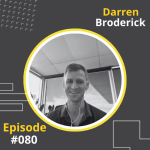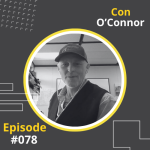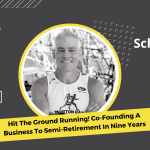Subscribe
Apple | Spotify | iHeart Radio | Stitcher | Radio FM
Becoming a Better Construction Leader
{These transcripts have been auto-generated, while largely accurate, they may contain some errors.}
Jordan: [00:00:00] Hello and welcome everybody to the very first episode of the crushing it in construction podcast. I’m your host, Jordan Skinner. And my very first guest is Elinor Moshe. Elinor is quite well known in the construction world. She is a coach, a thought leader an author, and she’s also the host of the Constructing You podcast.
Now, today we are talking about leadership. It’s always a hot button topic and in early 2022 Elinor is releasing her second book, which is called Leadership in Construction. And today Elinor will be sharing why improving as a leader is so important and what you can do today to start your journey towards becoming a better leader.
I really think you’re going to enjoy this episode, Elinor is sharing a lot of valuable information, so without further ado, let’s get into the episode.
Hi Elinor, Thanks for joining me today,
Elinor: [00:00:47] Pleasure and a privilege to be on the side of the microphone.
Jordan: [00:00:50] For those of you who don’t know you and don’t follow you on LinkedIn, can you give us a quick 60 to 90 second rundown on, on who you are and what it is you do?
Elinor: [00:00:58] Of course, I’m a thought leader in the construction industry that is here to disrupt. And of course, challenge, everyone’s thinking, I’m in the business of thinking. My business though, is the construction coach, which is Australia’s first construction coach.
And I guide, inspire and direct industry professionals and ambitious future leaders to achieve higher compensation, faster progression, and more recognition within their career. I’m also the number one best-selling author of a one of a kind and a first book “Constructing Your Career”, which gives people the pathway and the 12 foundational stages to work on their greatest project that they ever get to work on.
And I’m also the podcast host of “Constructing You” where I interview exemplary leaders and industry titans from property and construction, not just as to what they’ve done, but who they are to see how they got to where they are as well.
Jordan: [00:01:56] Yes, I’m a long-time listener of the podcast. Everybody should definitely go and check that out. So, if you can enlighten us a little bit more, tell us how you actually got into the construction industry. When you first started?
Elinor: [00:02:05] Similar to many people, you fumble into it and you happen to come across one of the largest industries that we get to experience. In my undergraduate, I completed architecture and whilst I was a creative, not by that typical sense.
And I was always very frustrated with the design process. And that was certainly not where my skill was, but I only got through it because I have an amazing way with words and I could really spin a poster or spin a model that the glue was still drying. So I definitely know my forte, and I knew I had to leave that.
And based on the career intelligence that I had at the time, I said, well, I need to do another degree in order to get into an industry or identify the career path and would i have done that, that way, knowing what I know now, absolutely not, but it got me to where I am. So I looked at the prospectus that was available and what stood out to me was construction management because I am someone who’s quite structured and process orientated, but still very creative.
I’ve got an amazing balance of left brain and right. And construction management as a whole spoke to me, but also felt that it would answer the questions of a burning passion that I had, which was about the built environment and how things actually came to be, how was something going to get up to level 10?
What about the finances? What about the legalities? So I said, you know, what have I got to lose? I left architecture behind and I enrolled in the master of construction management and it was everything at once. I absolutely loved it. It was fascinating in how it was this complete integration of both, the people and the finances and the actual technicality of building construction. And I suddenly found incredible opportunity within that industry and chose to pursue it.
Jordan: [00:03:59] Sounds great. It really is an interesting industry. And when you, um, when you think about it, I don’t think a lot of people really sit down and think about, you know, that, that massive building that’s getting built down the road or that tunnel that’s being built around the corner. They don’t really sit down and think about all the, all the things that actually go into it. And when you sit down and start diving into it, it is very interesting.
So what was it that made you transition into the thought leadership side of things? Was there a specific event or was there something happening in the industry that made you think, right.
You know, this is, this is the next chapter and this is what I’m going to go and pursue.
Elinor: [00:04:32] A few pivotal moments and chains of events happened at once. First was that I started thinking, what do I actually want for myself? I asked myself the question, what do I want? And then i realised outside of external conditions. I didn’t know what that was.
So I started the process of conceiving my own vision and identifying what is it that I truly want against all external metrics. And when I actually went down the process of conceiving and constructing my own vision, I realized that it was nothing like what it looked in the pathway that I was on. I thought that this is what I needed to do in order to have a successful career, which was back then, to just climb the corporate ladder.
But then my vision was drawing me and pulling me and showing me, another way to have a career things that I wanted to experience for myself. And I started going through this friction in my mental reality and the physical reality, just wasn’t making sense to me anymore. At the same time I was on a project that was horrible and absolutely toxic.
And I’m grateful that that happened because it also forced me to realize that hang on, I don’t want to spend the rest of my life working on inadequate projects with inadequate people that cause me a lot of anguish in every faculty of my life. It’s not worth it that there was no amount of money that would ever be really worth it.
And that was this one day on that site, it was October, so October in Melbourne, very grey, very bland. And I was standing in the site shed and the site sheds have bars on the windows and it was just a prison. That’s all that it felt like to me, it was a mental prison and I looked out the window and I said, this cant be it.
And I realized that up until that point, what I’ve done was I gave over agency over my career and my trajectory to other people and I wasn’t in control. So I took control that day and I said, I will take charge. And then at the same time, I started in a little bit of side hustling and identifying, hang on, there is this whole coaching world and the notion of the construction coach came to me in February that year as well.
And I started pursuing that idea, but I didn’t know what it would actually be. And it was because of my ambition to say, well, I need to get this message out that I need to get the construction coach out there. I found myself at an event where I met my thought leadership mentor Ron Malhotra, and I was immediately drawn to everything that Ron was and still is.
And I got on a call with Ron and he showed me that there is a third way of having a career. You can be a traditional entrepreneur. You can be a traditional employee, or you can become a thought leader. He showed me that there is the third path available to those who want to have an impact, have an influence and create a model of business that is wholly suited to who they are and the impact that they want to leave on the world.
Jordan: [00:07:31] Yeah, it was definitely paying off for you, that’s for sure. You’ve also got a new book coming out early next year. I know you spoke to me earlier and said, you’re not quite sure on the date yet, but the new book’s called “Leadership in Construction”. Why did you decide to write on that topic?
Elinor: [00:07:46] Its the arena that I am in. And what I have found was that there isn’t any real time up-to-date literature that gives people a cross section as to what it really takes to be an exemplary, excellent and exceptional leader. Not just in the construction industry, but any industry, because as I started from that point on of my thought leadership journey to where I am now, I just realized that the standards of operation both personally and professionally, that people adhere to and subscribe to and continue to be the example of is average.
And if something is average, it is a sum of many different things, but average is simply poor. I mean, what is good? It is so subpar to, so it, it means nothing. It doesn’t actually transform people. It doesn’t actually inspire other people to go and want to be more and have more of an impact.
So, as I was progressing through my journey and I’m someone who holds myself to extremely high standards, I thought I was crazy because no one else was doing it. But then I thought, hang on. No, I have high standards. Why did other people have high standards? So when I started realizing this and also identifying through my own experience and the experiences the other people were having with people who.
You know, quote-unquote, position themselves as leaders it was poor. So that was sort of the seeding event. And then I did say, well, I want to release a new book. What is an important topic that people need to increase their intelligence on? And that is leadership. So then I thought, well, I could write it by myself and that would be great, but you know what, I’m going to take it the next level.
And I’m going to get the real time wisdom and value from exemplary leaders and industry titans who are on the front line of construction every single day to be part of the book as well.
Jordan: [00:09:40] So who were those people that were a part of the research for the book?
Elinor: [00:09:43] Of course. So we have Alison Mirams, she’s the chief executive officer of Robert’s Co. David Russo, principal of Victoria and board member at Johnstaff. Davina Rooney, chief executive officer of the green building council of Australia. George Abraham, managing director of Hickory. Mark Nathan managing director and co-founder of Neoscape. Melanie Kurzydlo director of strategy and business relations at Growthbuilt. Rami Adra, director of Mossman builders. Sarah Slattery, managing director of Slattery. And last but of course, not least Tooey Courtemanche, founder, president, and CEO of Procore Technologies.
Jordan: [00:10:23] Okay. So we’ve only got a few hundred years worth of insights there that you’re drawing from, which is good. Who would you say that this book is, is actually for somebody who’s listening to this and they’re not quite sure where this book is for them or not. Who was this book really targeted to and who can it really help?
Elinor: [00:10:38] That’s a great question. In the thought leadership world, what we base our, I guess you can call it, say marketing or who we’re communicating to. It’s never based on demographics, but always on psychographics. This is what people who are ready to disrupt.
This is what people who are done with a status quo who are ready and able and wanting to be all of who they are so that they can have the greatest impact and influence. And in the book, what I’ve also done in the narrative is marry conventional leadership with thought leadership. So you get the best out of both worlds.
It’s written for the ambitious and the driven and the future focus leaders in the industry who aren’t willing to take any shortcuts in their development to function as a leader, because leadership is a function. It’s for people who have a burning desire and a true passion to cause this necessary disruption in the industry.
They’re not people who accept mediocre or average standards, but also hold themselves personally to the highest regards and the highest standards. It’s for people who will also focused on servitude and adding value to others first, before expecting anything in return. But most importantly is that they’re willing to earn the right to lead.
Jordan: [00:11:53] Yeah, I couldn’t agree more. There’s a lot of people that I think that deserve more than what they’re actually willing to work for. So it sounds great. So, and I think for anybody that’s probably listening to this podcast, they are definitely going to be the type of people that are motivated enough to try and learn more about leadership in construction.
they’re Switched on enough to try and educate themselves already with things like podcasts. So for somebody that’s wanting to start trying to become a better leader, what step one? What can they do tomorrow to start that journey?
Elinor: [00:12:22] First of all, recognize that they don’t know anything. That’s what I had to do on the journey as well. I had to recognize that there was no way that I knew everything or anything of what it took to establish authority, to know what it takes, to connect with people and bring them along on the journey.
If I assume that I really knew what it took then why was that i only where i was. Most people, they go around with a perception that their mind is full and everything that they know is already within their mind or within that capacity and yes, that is true but why do they only have the results of the have?
So the first thing that needs to come is to sort of play the fool and realize, you know what, I don’t know anything. And that is what should instigate and trigger that hunger to learn and people need to be extremely hungry to learn because leadership isn’t something that you just learn one day or do a three-day course.
And then you get some shitty piece of paper to say that you did a course and that I’m a leader. It doesn’t work like that. This is something that you do every single day. It’s a modality of life, it’s not something that I can switch off, I’m always on as a leader. So being able to have that true hunger and that true vision is imperative because what I also see is that people will, you know, get up to a burning start.
And then after six months they’ve built their community, they’ve served people and then they’re gone, they’re done. You’ve done a disservice to the people who have made a conscious decision to follow you. You know, the fast thing is to certainly have that hunger and not let your ego intelligence get in the way to think that I know what it takes to lead.
Or my workplace is going to teach me everything that I need to know. So Being able to say okay right. Who has the results that I would like to seek for myself and what can I do to work with them? Because the only way that you can bypass the time is by leaning into the experience of someone else that might be somebody in your corporate environment.
That’s fantastic. But if that person doesn’t exist you need to find them and you need to align yourself and work with them so that you’re not left figuring things out, but you can learn as quickly as you can, so you can implement as quickly as you can as well.
Jordan: [00:14:38] Yeah, I think that’s a really good point because while the construction industry has got a lot of things that need fixing at the minute, I think a large majority of the problems that the industry does have, could be fixed through more effective leadership.
So that’s a reason why this book is so important or, and topics like this are so important. If somebody was coming away from this podcast and you could just let them have a one takeaway, what would be the most important takeaway that you want them to take with them? You know, after listening to this podcast.
Elinor: [00:15:06] oh, I need to have two factors to that.
Number one is vision. What do you want? What do you actually want? Because this is what my book is structured on. First instruction on constructing you. If someone doesn’t have the ability to lead themselves, then they haven’t earnt the right to lead someone else. And when you ask most people, what do they actually want for themselves in the longterm, in every arena of their life, they just draw blanks. That immediately disqualifies someone from actually being a triple-e leader, which is an exceptional and excellent leader.
That’s the term that i use in my book. So they have to start having that deep introspection first and foremost. But then twofold to that, is taking massive and immediate action. Action needs to be those two things you want to go down the path of establishing yourself as a thought leader, becoming an exceptional corperate leader, becoming an entrepreneur, whatever it is that you decide.
Action needs to be immediate because there’s no point doing something massive 12 months from now. And it has to again, be massive because if it’s not massive, you’re still in your comfort zone and nothing fantastic happens out of your comfort zone. if people actually stay in their comfort zone, they’re going backwards because everything else around them, whether they like it or not is moving fast and forward around them.
So taking immediate and massive action, maybe that means, you know what, I’m going to do that 12 month mentoring program. I’m going to start that business. I’m going to go full immersion into creating my vision, whatever it is, take massive and immediate action. And you will be thankful at the start of 2023 if you did that.
Jordan: [00:16:45] Yeah, definitely. I hope everybody paid attention there because what Elinor touched on was really important, action. If you don’t do anything about, you know, your current situation or whatever it is you’re trying to change, nothing’s going to change. So we’re just going to start rounding things out, change speed, slightly. Elinor. If you could go back in time and give yourself one piece of advice, when you were entering the construction industry, what would that be?
Elinor: [00:17:07] Look at all the common beliefs and the common narratives that most people in the industry are subscribing to and do the exact opposite. Do not take on the common narrative and the common belief system that people in the construction industry carry because most people are subscribing to beliefs that they haven’t actually discovered for themselves.
And they’re not beliefs that they have challenged for themselves. And history has always shown if the herd is going one way, it’s a sign of danger. Go the other way. And I did subscribe to so many ideologies in the construction industry, which was so rigid that they weren’t serving me. And it was only when my own paradigm started to break down that I realized, hang on, this, isn’t serving me.
I can subscribe to another belief, which actually aids my goals.
Jordan: [00:17:57] Yeah great. Where can people find you online? Um, firstly, and connect with you and more importantly, where can they get a copy of the book when the book comes out.
Elinor: [00:18:06] Pre-orders for my book are available at www.theconstructioncoach.com.au And if anyone loves the value that they got from this episode, you can connect with me at Elinor Moshe underscore on Instagram. And of course, Elinor Moshe on LinkedIn.
Jordan: [00:18:22] Elinor, thanks very much for coming on the show today. I really appreciate it. And I’m sure all of our listeners will have appreciated the insight that you’ve provided as well.
Elinor: [00:18:30] Thank you for the opportunity Jordan and this podcast will go down as the first one, which I have been interviewed on my book. So thank you for the opportunity.
Jordan: [00:18:39] No problem. No problem. We really appreciated having you on here. So have a great rest of your day.
Elinor:[00:18:43] Thankyou




